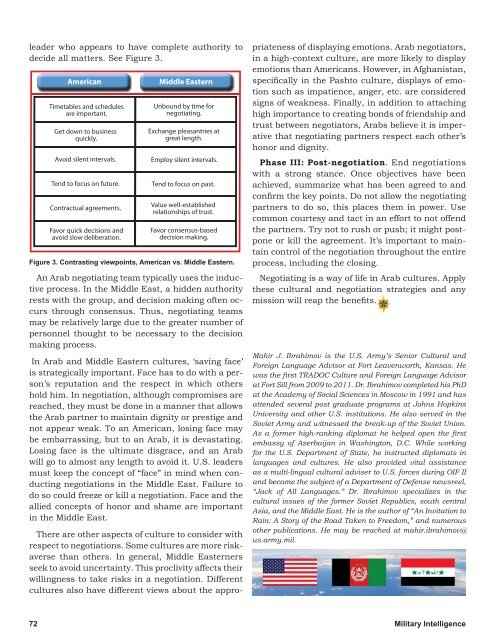George w. casey jr. - Federation of American Scientists
George w. casey jr. - Federation of American Scientists
George w. casey jr. - Federation of American Scientists
You also want an ePaper? Increase the reach of your titles
YUMPU automatically turns print PDFs into web optimized ePapers that Google loves.
leader who appears to have complete authority to<br />
decide all matters. See Figure 3.<br />
<strong>American</strong><br />
Timetables and schedules<br />
are important.<br />
Get down to business<br />
quickly.<br />
Avoid silent intervals.<br />
Tend to focus on future.<br />
Contractual agreements.<br />
Favor quick decisions and<br />
avoid slow deliberation.<br />
Middle Eastern<br />
Unbound by time for<br />
negotiating.<br />
Exchange pleasantries at<br />
great length.<br />
Employ silent intervals.<br />
Tend to focus on past.<br />
Value well-established<br />
relationships <strong>of</strong> trust.<br />
Favor consensus-based<br />
decision making.<br />
Figure 3. Contrasting viewpoints, <strong>American</strong> vs. Middle Eastern.<br />
An Arab negotiating team typically uses the inductive<br />
process. In the Middle East, a hidden authority<br />
rests with the group, and decision making <strong>of</strong>ten occurs<br />
through consensus. Thus, negotiating teams<br />
may be relatively large due to the greater number <strong>of</strong><br />
personnel thought to be necessary to the decision<br />
making process.<br />
In Arab and Middle Eastern cultures, ‘saving face’<br />
is strategically important. Face has to do with a person’s<br />
reputation and the respect in which others<br />
hold him. In negotiation, although compromises are<br />
reached, they must be done in a manner that allows<br />
the Arab partner to maintain dignity or prestige and<br />
not appear weak. To an <strong>American</strong>, losing face may<br />
be embarrassing, but to an Arab, it is devastating.<br />
Losing face is the ultimate disgrace, and an Arab<br />
will go to almost any length to avoid it. U.S. leaders<br />
must keep the concept <strong>of</strong> “face” in mind when conducting<br />
negotiations in the Middle East. Failure to<br />
do so could freeze or kill a negotiation. Face and the<br />
allied concepts <strong>of</strong> honor and shame are important<br />
in the Middle East.<br />
There are other aspects <strong>of</strong> culture to consider with<br />
respect to negotiations. Some cultures are more riskaverse<br />
than others. In general, Middle Easterners<br />
seek to avoid uncertainty. This proclivity affects their<br />
willingness to take risks in a negotiation. Different<br />
cultures also have different views about the appropriateness<br />
<strong>of</strong> displaying emotions. Arab negotiators,<br />
in a high-context culture, are more likely to display<br />
emotions than <strong>American</strong>s. However, in Afghanistan,<br />
specifically in the Pashto culture, displays <strong>of</strong> emotion<br />
such as impatience, anger, etc. are considered<br />
signs <strong>of</strong> weakness. Finally, in addition to attaching<br />
high importance to creating bonds <strong>of</strong> friendship and<br />
trust between negotiators, Arabs believe it is imperative<br />
that negotiating partners respect each other’s<br />
honor and dignity.<br />
Phase III: Post-negotiation. End negotiations<br />
with a strong stance. Once objectives have been<br />
achieved, summarize what has been agreed to and<br />
confirm the key points. Do not allow the negotiating<br />
partners to do so, this places them in power. Use<br />
common courtesy and tact in an effort to not <strong>of</strong>fend<br />
the partners. Try not to rush or push; it might postpone<br />
or kill the agreement. It’s important to maintain<br />
control <strong>of</strong> the negotiation throughout the entire<br />
process, including the closing.<br />
Negotiating is a way <strong>of</strong> life in Arab cultures. Apply<br />
these cultural and negotiation strategies and any<br />
mission will reap the benefits.<br />
Mahir J. Ibrahimov is the U.S. Army’s Senior Cultural and<br />
Foreign Language Advisor at Fort Leavenworth, Kansas. He<br />
was the first TRADOC Culture and Foreign Language Advisor<br />
at Fort Sill from 2009 to 2011. Dr. Ibrahimov completed his PhD<br />
at the Academy <strong>of</strong> Social Sciences in Moscow in 1991 and has<br />
attended several post graduate programs at Johns Hopkins<br />
University and other U.S. institutions. He also served in the<br />
Soviet Army and witnessed the break-up <strong>of</strong> the Soviet Union.<br />
As a former high-ranking diplomat he helped open the first<br />
embassy <strong>of</strong> Azerbaijan in Washington, D.C. While working<br />
for the U.S. Department <strong>of</strong> State, he instructed diplomats in<br />
languages and cultures. He also provided vital assistance<br />
as a multi-lingual cultural adviser to U.S. forces during OIF II<br />
and became the subject <strong>of</strong> a Department <strong>of</strong> Defense newsreel,<br />
“Jack <strong>of</strong> All Languages.” Dr. Ibrahimov specializes in the<br />
cultural issues <strong>of</strong> the former Soviet Republics, south central<br />
Asia, and the Middle East. He is the author <strong>of</strong> “An Invitation to<br />
Rain: A Story <strong>of</strong> the Road Taken to Freedom,” and numerous<br />
other publications. He may be reached at mahir.ibrahimov@<br />
us.army.mil.<br />
72 Military Intelligence















